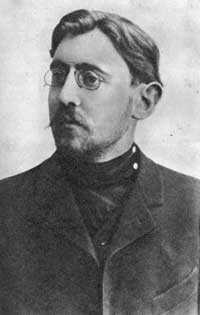Yakov Perelman
| Yakov I. Perelman | |
|---|---|
 Yakov Perelman around 1910. | |
| Born |
December 4, 1882 Białystok, Congress Poland |
| Died |
March 16, 1942 (aged 59) Leningrad, Soviet Union |
Yakov Isidorovich Perelman (Russian: Яков Исидорович Перельман; December 4, 1882 – March 16, 1942) was a Russian and Soviet science writer and author of many popular science books, including Physics Can Be Fun and Mathematics Can Be Fun (both translated from Russian into English).
Perelman was born in 1882 in the town of Białystok, Congress Poland. He obtained the diploma of forester from the Imperial Forestry Institute in Saint Petersburg, in 1909. After the success of "Physics for Entertainment", Perelman set out to produce other books, in which he showed himself to be an imaginative populariser of science. Especially popular were "Arithmetic for entertainment", "Mechanics for entertainment", "Geometry for Entertainment", "Astronomy for entertainment", "Lively Mathematics", " Physics Everywhere", and "Tricks and Amusements".
His famous books on physics and astronomy were translated into various languages by the erstwhile Soviet Union.
The great scientist Konstantin Tsiolkovsky always thought highly of the talent and creative genius of Perelman. He wrote of him in the preface of Interplanetary Journeys: "The author has long been known by his popular, witty and quite scientific works on physics, astronomy and mathematics, which are, moreover written in a marvelous language and are very readable."
Perelman has also authored a number of textbooks and articles in Soviet popular science magazines.
In addition to his educational, scientific and literary activities, he has also devoted much time to editing. He was the editor of magazines Nature and people and In the workshop of nature.
Perelman died from starvation in 1942, during the German Siege of Leningrad. The siege started at 9 September 1941 and lasted 872 days, till 27 January 1944. The Siege of Leningrad was one of the longest and most destructive sieges of major cities in modern history and it is one of the costliest in terms of casualties (1,117,000).[1]
He is not related to the Russian mathematician Grigori Perelman, who was born in 1966 to a different Yakov Perelman. However, Grigori Perelman told The New Yorker that his father gave him Physics for Entertainment, and it inspired his interest in mathematics.[2]
Books
- Mathematics can be Fun
- Astronomia Recreativa
- Physics for Entertainment (1913)
- Figures for Fun
- Algebra can be Fun
- Fun with Maths & Physics
- Arithmetic for entertainment
- Mechanics for entertainment
- Geometry for Entertainment
- Astronomy for entertainment
- Lively Mathematics
- Physics Everywhere
- Tricks and Amusements
He has also written several books on interplanetary travel (Interplanetary Journeys, On a rocket to stars, and World Expanses etc.)
Physics for entertainment
In 1913 in Russian bookshops appeared a book by the outstanding educationalist, entitled Physics for entertainment. It struck the fancy of the young who found in it the answers to many of the questions that interested them.
Physics for entertainment had not only an interesting layout, it was also immensely instructive. In the preface to the 11th edition, Perelman wrote: "The main objective of Physics for entertainment is to arouse the activity of scientific imagination, to teach the reader to think in the spirit of the science of physics and to create in his mind a wide variety of associations of physical knowledge with the widely differing facts of life, with all that he normally comes into contact with".
In the foreword, the book’s author describes the contents as “conundrums, brain-teasers, entertaining anecdotes, and unexpected comparisons,” adding, “I have quoted extensively from Jules Verne, H. G. Wells, Mark Twain and other writers, because, besides providing entertainment, the fantastic experiments these writers describe may well serve as instructive illustrations at physics classes.” The last edition (thirteenth), in lifetime of author was published in 1936. One of the most interesting topic of the book is, the idea of a perpetual machine (a hypothetical machine which is able to run incessantly and can do some useful work) and perpetual motion. The book explains many attempts made to build such machine and reasons why they didn't work. Other topics included how to jump from a moving car, and why, “according to the law of buoyancy, we would never drown in the Dead Sea.”
See also
References
- ↑ Доктор занимательных наук. Книги. Наука и техника
- ↑
- Nasar, Sylvia; Gruber, David (21 August 2006). "Manifold Destiny: A legendary problem and the battle over who solved it.". The New Yorker. Retrieved 2006-08-24.
External links
- Physics for Entertainment Free electronic edition at the Internet Archive.
- Figure for Fun: Stories and Conundrums Free electronic edition at the Internet Archive.
- Astronomy for Entertainment
- Biography in Spanish.
|